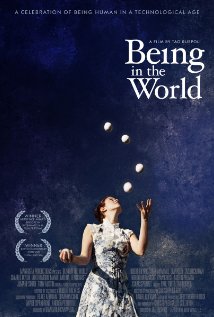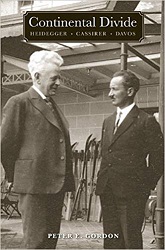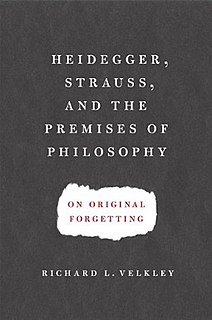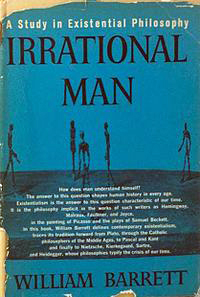 W
WBeing after Rousseau: Philosophy and Culture in Question is a book by Richard Velkley, in which the author offers an assessment of the position of Jean-Jacques Rousseau's thought within modern philosophy.
 W
WBeing in the World is a 2010 documentary film directed by Tao Ruspoli. The film is based on Martin Heidegger's philosophy and is inspired by Hubert Dreyfus. It features a number of prominent philosophers.
 W
WContinental Divide: Heidegger, Cassirer, Davos is a 2010 book by Peter Gordon, in which the author reconstructs the famous 1929 debate between Martin Heidegger and Ernst Cassirer at Davos, Switzerland, demonstrating its significance as a point of rupture in Continental thought that implicated all the major philosophical movements of the day. Continental Divide was awarded the Jacques Barzun Prize from the American Philosophical Society in 2010.
 W
WThe Early Heidegger and Medieval Philosophy: Phenomenology for the Godforsaken is a 2006 book by Sean J. McGrath, in which the author critiques secularization through examining the relationship between Martin Heidegger's thought and late medieval and early Protestant Christianity.
 W
WHannah Arendt is a 2012 biographical drama film directed by Margarethe von Trotta and starring Barbara Sukowa. An international co-production from Germany, Luxembourg and France, the film centers on the life of German-Jewish philosopher and political theorist Hannah Arendt. The film, distributed by Zeitgeist Films in the United States, opened theatrically on 29 May 2013.
 W
WHeidegger and the Place of Ethics: Being-with in the Crossing of Heidegger's Thought is a 2005 book by British philosopher Michael Lewis in which the author examines Heideggerian ethics with a focus on the concept being-with and revisits the relationship between ethics and politics in Heidegger's thought which can be seen in his engagement with Nazism.
 W
WHeidegger on Concepts, Freedom, and Normativity is a 2014 book by the philosopher Sacha Golob, in which the author provides an account of the arguments and concepts characterizing the philosopher Martin Heidegger's early thought and examines their positions both in contemporary analytic philosophy and the history of philosophy. He argues against existing interpretations of Heidegger on intentionality and believes that Heidegger emphasizes a unique position regarding conceptual and representational content.
 W
WHeidegger Studies is an annual peer-reviewed academic journal covering the thought of Martin Heidegger published by Duncker & Humblot. It was established in 1985 and publishes contributions in English, German, and French. The editors-in-chief are Parvis Emad, Friedrich-Wilhelm von Herrmann, Pascal David, Paola-Ludovika Coriando, and Ingeborg Schüßler. All issues are available online from the Philosophy Documentation Center.
 W
WHeidegger, Strauss, and the Premises of Philosophy: On Original Forgetting is a book by Richard Velkley, in which the author examines the philosophical relationship between Martin Heidegger and Leo Strauss. It has been translated into French and Chinese.
 W
WHeidegger: A (Very) Critical Introduction is a 2008 book by Sean J. McGrath, in which the author provides a theological analysis of Martin Heidegger's thought and its relation with his political endeavors.
 W
WHuman, All Too Human is a three-part 1999 documentary television series co-produced by the BBC and RM Arts. It follows the lives of three prominent European philosophers: Friedrich Nietzsche, Martin Heidegger and Jean-Paul Sartre. The theme revolves heavily around the school of philosophical thought known as Existentialism, although the term had not been coined at the time of Nietzsche's writing and Heidegger declaimed the label.
 W
WIrrational Man: A Study in Existential Philosophy is a 1958 book by the philosopher William Barrett, in which the author explains the philosophical background of existentialism and provides a discussion of several major existentialist thinkers, including Søren Kierkegaard, Friedrich Nietzsche, Martin Heidegger, and Jean-Paul Sartre. Irrational Man helped to introduce existentialism to the English-speaking world and has been identified as one of the most useful books that discuss the subject, but Barrett has also been criticized for endorsing irrationality and for giving a distorted and misleading account of Georg Wilhelm Friedrich Hegel.
 W
WLukacs and Heidegger: Towards a New Philosophy is a book by Lucien Goldmann published after his death in 1973.
 W
WSartre and his Predecessors: The Self and the Other is a 1984 book by William R. Schroeder, in which the author provides an explanation and critical examination of the thought of Jean-Paul Sartre, Martin Heidegger, Edmund Husserl and Georg Wilhelm Friedrich Hegel.
 W
WLa sombra de Heidegger is a 2005 thriller written by the Argentine philosopher and novelist José Pablo Feinmann. It depicts an exiled Nazi professor called Dieter Müller who writes a letter to his son, in which he describes the philosophy of Martin Heidegger as the spiritual guidance of the Nazi Party. Besides, La sombra de Heidegger has some elements that would enable it to be included in the category of historical novel. Although there are fictional characters, most of the people involved in the novel are public—and often controversial—figures, such as Adolf Hitler, Ernst Röhm, Jean-Paul Sartre and so on.The novel also covers topics of Argentine political life. More than once Müller satirizes the situation of peronism in Argentina.